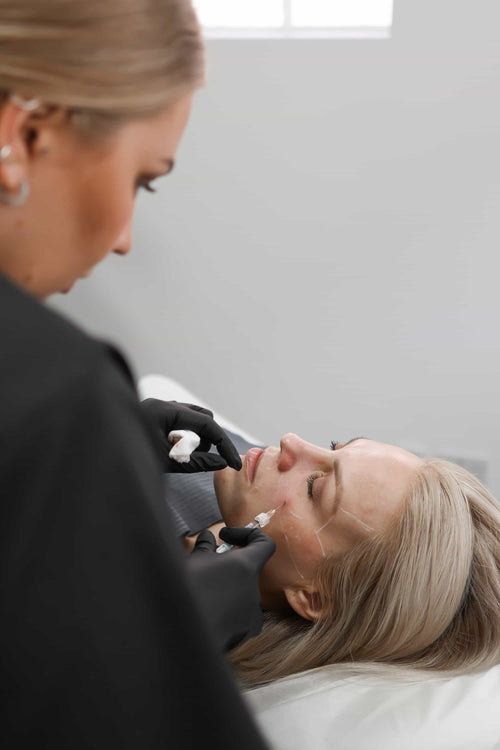Get Started with Dermal Fillers – Consult Dr. Laura Geige
Risks to Mother & Baby
Hormonal Changes
Pregnancy brings numerous physiological changes that impact both mother and baby. Hormonal fluctuations are a key factor influencing these changes, making it crucial to consider their implications for various medical procedures, including cosmetic treatments like lip fillers.
One primary risk associated with lip filler injections during pregnancy is the potential for hormonal imbalances to alter the body’s response to the filler. Hormones like estrogen and progesterone fluctuate significantly throughout pregnancy, which can affect the absorption, distribution, and breakdown of the injected material.
This unpredictable response could lead to unexpected results, such as uneven or lumpy filler placement, delayed resorption, or even allergic reactions that may be more severe than usual.
Furthermore, certain fillers contain hyaluronic acid, a naturally occurring substance in the body. While generally considered safe, during pregnancy, the increased metabolic activity and potential for blood vessel changes might lead to complications if the filler disrupts these processes.
The impact on the developing fetus is another significant concern. Although research on the direct effects of lip fillers on pregnancy is limited, the possibility of unknown long-term consequences cannot be disregarded.
The potential for the filler ingredients to cross the placenta and affect fetal development raises ethical and safety concerns. It’s important to prioritize the well-being of both mother and baby by avoiding procedures with uncertain risks during this sensitive period.
Ultimately, it’s crucial to consult with a qualified healthcare provider before undergoing any cosmetic procedure during pregnancy. They can assess individual circumstances, discuss potential risks and benefits, and provide personalized guidance based on the latest medical evidence and ethical considerations.
Blood Flow & Healing
Pregnancy significantly alters a woman’s physiology, making it crucial to consider the potential risks associated with any medical procedure, including lip fillers.

Here are some key risks associated with getting lip fillers while pregnant:
-
Blood Flow and Clotting Changes: During pregnancy, blood volume increases, and blood clots become more likely. Injecting filler materials can disrupt blood flow and increase the risk of complications like deep vein thrombosis (DVT), pulmonary embolism (PE), or other clotting issues.
-
Hormonal Fluctuations: Pregnancy hormones can cause unpredictable reactions to fillers, leading to uneven distribution, swelling that lasts longer than expected, or an allergic response.
-
Impact on Fetal Development: While research on the direct effects of lip fillers on fetal development is limited, any substances injected into the mother’s bloodstream can potentially cross the placenta and affect the fetus. It’s best to err on the side of caution and avoid unnecessary risks.
-
Increased Sensitivity: Pregnant women often experience heightened sensitivity to pain and swelling. This can make the lip filler procedure more uncomfortable and increase the risk of bruising or infection.
Additionally, consider the following:
-
Healing Complications: Pregnancy hormones can slow down healing processes, increasing the risk of infection or delayed resolution of any post-procedural swelling or discomfort.
Overall, the potential risks associated with lip fillers during pregnancy outweigh any perceived benefits. It’s always best to consult with a qualified healthcare provider who specializes in maternal health for personalized advice and guidance.
Needle Complications
Lip fillers, while generally considered safe for non-pregnant individuals, carry potential risks for both mother and baby during pregnancy. These risks stem from the use of hyaluronic acid, a gel-like substance used in dermal fillers, which can cross the placenta.
Here’s a breakdown of the potential risks:
- Maternal Risks:
While rare, some individuals may experience allergic reactions to hyaluronic acid filler. Symptoms can range from mild redness and swelling to more severe anaphylaxis.
Complications from the injection procedure itself, such as bruising, infection, or nerve damage, are also possible.
- Fetal Risks:
The primary concern with lip filler during pregnancy is the potential for hyaluronic acid to cross the placenta and affect fetal development.
Research on the specific effects of hyaluronic acid on a developing fetus is limited, but some experts caution against its use due to the possibility of unknown long-term consequences.
It’s important to note that these risks are generally considered low. However, given the potential for harm, many healthcare professionals recommend avoiding lip filler injections during pregnancy and breastfeeding.
Needle Complications:
Complications related to the needle itself are also possible during any injection procedure, including lip fillers:
- Infection:
- Bleeding:
- Nerve Damage:
A common risk of any puncture wound is infection. Proper sterilization techniques are essential to minimize this risk.
Some people may experience more bleeding than expected at the injection site.
The needles used in lip fillers can potentially damage nearby nerves, leading to temporary or even permanent numbness or tingling.
It’s crucial to choose a qualified and experienced injector who follows strict safety protocols to reduce the risk of needle complications.
Safety First: Alternatives During Pregnancy
Topical Options for Plumping Lips
Pregnancy brings a whirlwind of changes to a woman’s body, and it’s natural to want to enhance one’s features, including fuller lips. However, when it comes to procedures like lip fillers during pregnancy, safety takes absolute priority.
Lip fillers typically contain hyaluronic acid, a naturally occurring substance in the body that adds volume and hydration to the lips. While generally considered safe for non-pregnant individuals, injecting substances into the bloodstream during pregnancy raises concerns due to the potential unknown effects on both mother and developing fetus.
The FDA has not approved lip fillers specifically for pregnant women, and many medical professionals advise against them altogether. The risks associated with injecting anything into the body during pregnancy are simply too high, as there’s limited research on the long-term consequences.
Fortunately, there are safer alternatives to consider if you desire plumper lips during pregnancy:
**Topical Options:**
– **Lip Plumping Glosses and Balms:** These products often contain ingredients like menthol or cinnamon that create a temporary tingling sensation, making the lips appear fuller.
– **Hyaluronic Acid Serums and Lip Masks:** Applying hyaluronic acid topically can draw moisture to the lips, making them look plumper and hydrated.
– **Exfoliating Scrubs:** Regularly exfoliating your lips removes dead skin cells, revealing smoother and more defined lips.
– **Healthy Lifestyle:** Staying hydrated, eating a balanced diet rich in vitamins and minerals, and getting enough sleep all contribute to overall skin health, including the appearance of your lips.
Remember, prioritizing safety during pregnancy is paramount. Consulting with your doctor or dermatologist about the best lip enhancement options for you is essential.
Microneedling After Delivery
While many cosmetic procedures are tempting during pregnancy, safety always comes first for both mother and baby.
Microneedling and lip fillers fall under this umbrella of “wait-until-after” treatments.
Here’s why:
* **Hormonal Changes:** Pregnancy involves significant hormonal fluctuations that can affect how your body responds to procedures like microneedling and fillers. This could lead to unpredictable results, increased healing time, or even complications.
* **Unknown Effects on the Fetus:** The impact of certain ingredients in dermal fillers and microneedling solutions on a developing fetus is not yet fully understood. It’s best to err on the side of caution and avoid potential risks.
Get Started with Dermal Fillers – Consult Dr. Laura Geige
* **Compromised Immune System:** During pregnancy, your immune system undergoes changes to support the baby. This can make you more susceptible to infections, which could be a risk associated with any invasive procedure like microneedling.
**Alternatives During Pregnancy:**
1. **Embrace Your Natural Beauty:**
Pregnancy is a time of incredible transformation. Focus on nourishing your body and celebrating the changes happening within you.
2. **Gentle Skincare:** Prioritize a simple, gentle skincare routine that focuses on hydration and nourishment. Look for products specifically formulated for sensitive skin during pregnancy.
3. **Professional Makeup Consultations:** A makeup artist can help you enhance your natural features with safe and effective techniques and products designed for pregnant women.
**Microneedling After Delivery:**
Once you’ve recovered from childbirth and received clearance from your healthcare provider, microneedling can be a great way to address skin concerns like fine lines, wrinkles, and acne scarring.
Remember, the best course of action is always to consult with your doctor or dermatologist before undergoing any cosmetic procedure during or after pregnancy. They can provide personalized advice based on your individual circumstances and health history.
Book Your Dermal Filler Session with Dr. Laura Geige Now
Consultation is Key
Finding a Pregnancy-Friendly Provider
Navigating medical procedures during pregnancy can be overwhelming, and it’s understandable to wonder about treatments like lip fillers.
First and foremost, consult with your doctor or midwife. They are your primary source of information regarding what is safe for you and your developing baby.
While there isn’t a definitive “yes” or “no” answer about lip filler during pregnancy, the general consensus among medical professionals leans towards caution.
The chemicals in fillers are not fully understood when it comes to their potential impact on a fetus.
Additionally, pregnancy hormones can make your skin more sensitive and susceptible to reactions.
Finding a provider who specializes in pregnancy-friendly care is crucial. Look for practitioners experienced with treating expectant mothers, as they will be more knowledgeable about the potential risks and benefits associated with various procedures during this time.
Don’t hesitate to ask questions and discuss your concerns openly with your doctor and any potential providers. Your health and the well-being of your baby are paramount.
Create Cocktails at Home Democracy Defense Coalition Couture Lust Create Cocktails at Home
- Under Eye Botox In Woodmansterne, Surrey - November 17, 2025
- Why Breadcrumbing Is An Emotionally Unhealthy Dating Habit - November 3, 2025
- What Is The Alternative To Tear Trough Fillers? - October 31, 2025
